Samaa Elnagar
A Cognitive Ideation Support Framework using IBM Watson Services
Dec 18, 2024



Abstract:Ideas generation is a core activity for innovation in organizations. The creativity of the generated ideas depends not only on the knowledge retrieved from the organizations' knowledge bases, but also on the external knowledge retrieved from other resources. Unfortunately, organizations often cannot efficiently utilize the knowledge in the knowledge bases due to the limited abilities of the search and retrieval mechanisms especially when dealing with unstructured data. In this paper, we present a new cognitive support framework for ideation that uses the IBM Watson DeepQA services. IBM Watson is a Question Answering system which mimics human cognitive abilities to retrieve and rank information. The proposed framework is based on the Search for Ideas in the Associative Memory (SIAM) model to help organizations develop creative ideas through discovering new relationships between retrieved data. To evaluate the effectiveness of the proposed system, the generated ideas generated are selected and assessed using a set of established creativity criteria.
SAFEMYRIDES: Application of Decentralized Control Edge-Computing to Ridesharing Monitoring Services
Jan 02, 2023Abstract:Edge computing is changing the face of many industries and services. Common edge computing models offload computing which is prone to security risks and privacy violation. However, advances in deep learning enabled Internet of Things (IoTs) to take decisions and run cognitive tasks locally. This research introduces a decentralized-control edge model where most computation and decisions are moved to the IoT level. The model aims at decreasing communication to the edge which in return enhances efficiency and decreases latency. The model also avoids data transfer which raises security and privacy risks. To examine the model, we developed SAFEMYRIDES, a scene-aware ridesharing monitoring system where smart phones are detecting violations at the runtime. Current real-time monitoring systems are costly and require continuous network connectivity. The system uses optimized deep learning that run locally on IoTs to detect violations in ridesharing and record violation incidences. The system would enhance safety and security in ridesharing without violating privacy.
What is Cognitive Computing? An Architecture and State of The Art
Jan 02, 2023



Abstract:Cognitive Computing (COC) aims to build highly cognitive machines with low computational resources that respond in real-time. However, scholarly literature shows varying research areas and various interpretations of COC. This calls for a cohesive architecture that delineates the nature of COC. We argue that if Herbert Simon considered the design science is the science of artificial, cognitive systems are the products of cognitive science or 'the newest science of the artificial'. Therefore, building a conceptual basis for COC is an essential step into prospective cognitive computing-based systems. This paper proposes an architecture of COC through analyzing the literature on COC using a myriad of statistical analysis methods. Then, we compare the statistical analysis results with previous qualitative analysis results to confirm our findings. The study also comprehensively surveys the recent research on COC to identify the state of the art and connect the advances in varied research disciplines in COC. The study found that there are three underlaying computing paradigms, Von-Neuman, Neuromorphic Engineering and Quantum Computing, that comprehensively complement the structure of cognitive computation. The research discuss possible applications and open research directions under the COC umbrella.
Explaining Cognitive Computing Through the Information Systems Lens
Jan 16, 2022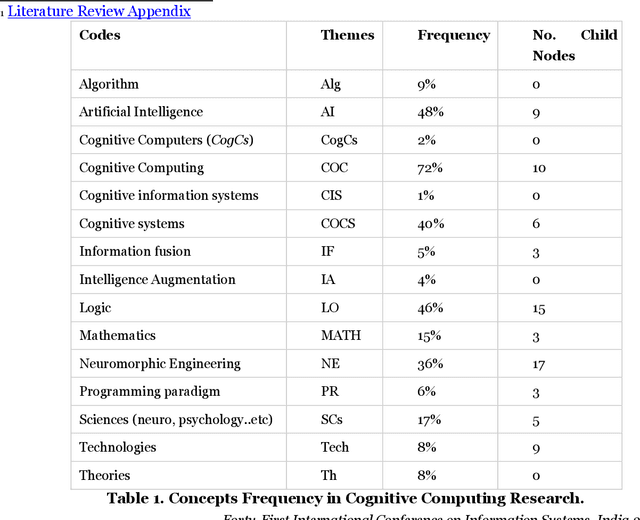
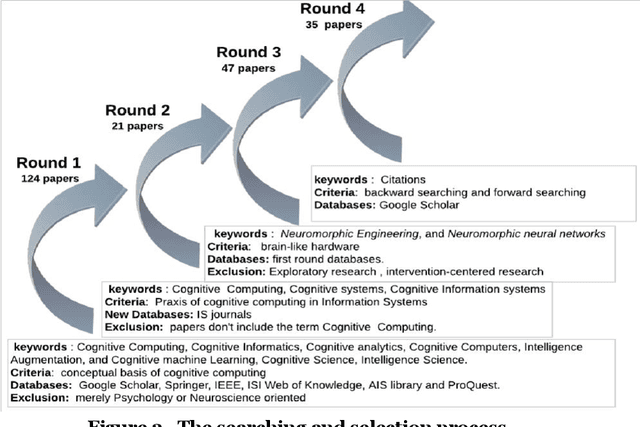
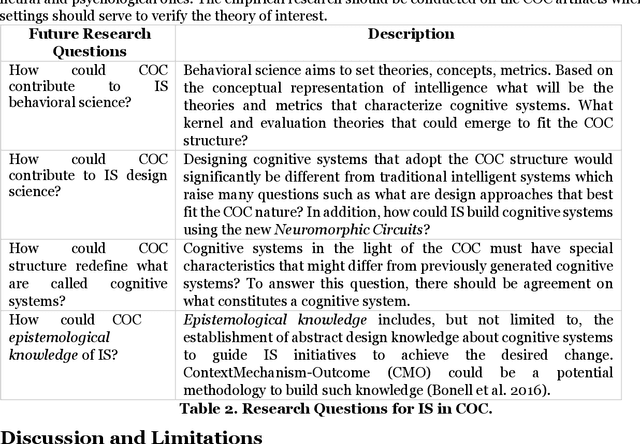
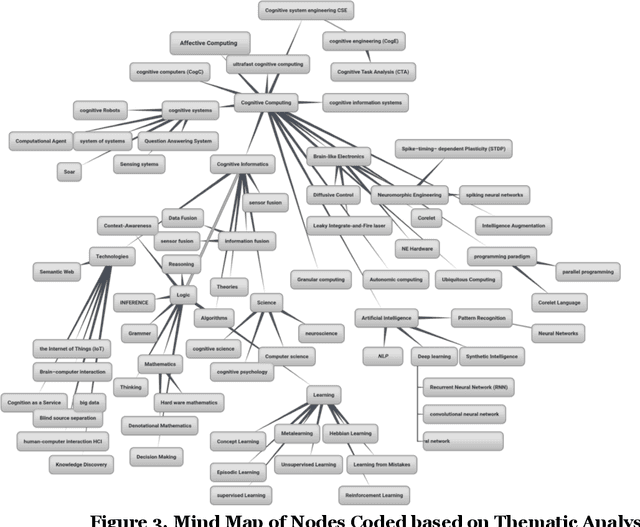
Abstract:Cognitive computing (COC) aims to embed human cognition into computerized models. However, there is no scientific classification that delineates the nature of Cognitive Computing. Unlike the medical and computer science fields, Information Systems (IS) has conducted very little research on COC. Although the potential to make important research contributions in this area is great, we argue that the lack of a cohesive interpretation of what constitutes COC has led to inferior COC research in IS. Therefore, we need first to clearly identify COC as a phenomenon to be able to identify and guide prospective research areas in IS. In this research, a phenomenological approach is adopted using thematic analysis to the published literature in COC research. Then, we discuss how IS may contribute to the development of design science artifacts under the COC umbrella. In addition, the paper raises important questions for future research by highlighting how IS researchers could make meaningful contributions to this emerging topic.
An Automatic Ontology Generation Framework with An Organizational Perspective
Jan 15, 2022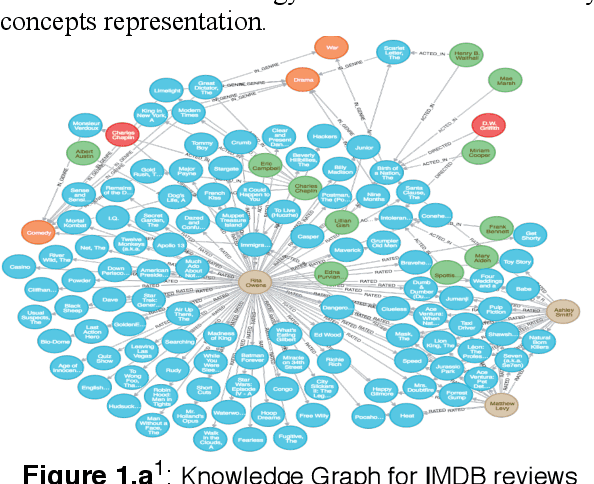
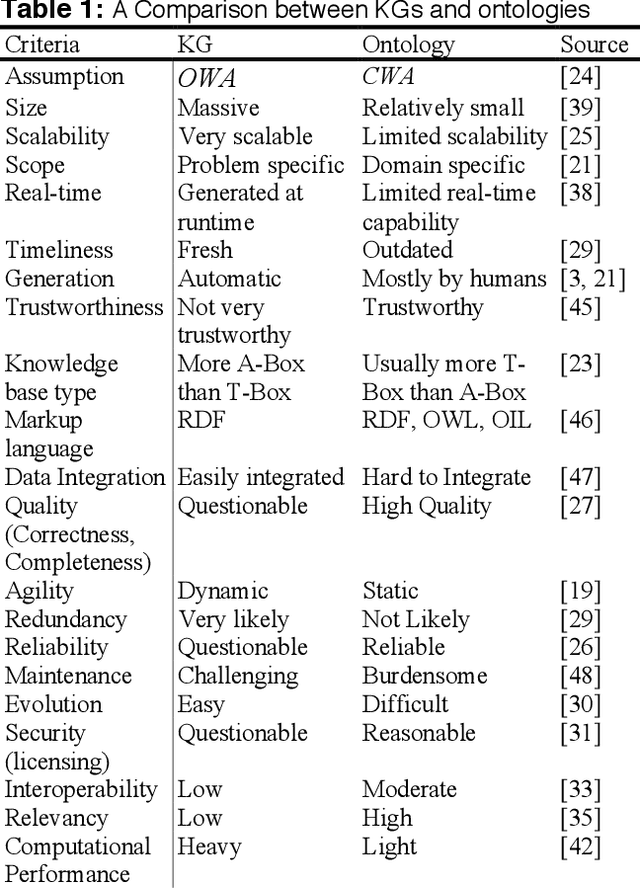
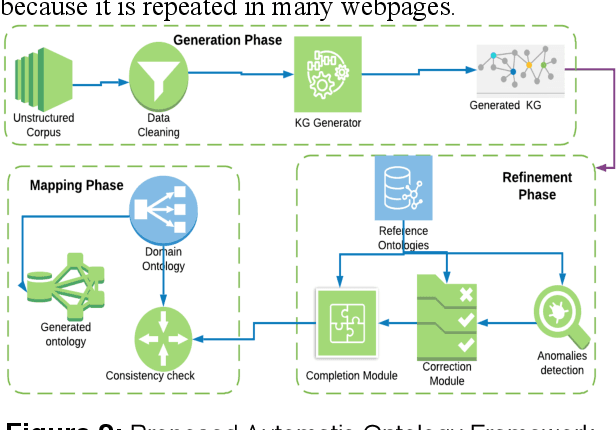
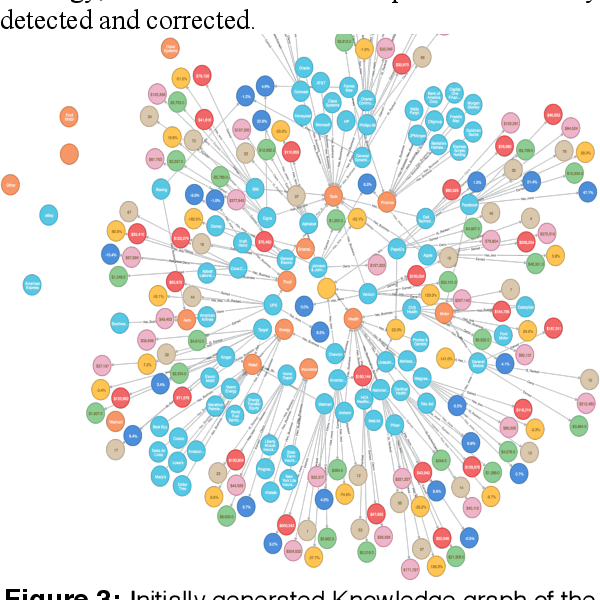
Abstract:Ontologies have been known for their semantic representation of knowledge. ontologies cannot automatically evolve to reflect updates that occur in respective domains. To address this limitation, researchers have called for automatic ontology generation from unstructured text corpus. Unfortunately, systems that aim to generate ontologies from unstructured text corpus are domain-specific and require manual intervention. In addition, they suffer from uncertainty in creating concept linkages and difficulty in finding axioms for the same concept. Knowledge Graphs (KGs) has emerged as a powerful model for the dynamic representation of knowledge. However, KGs have many quality limitations and need extensive refinement. This research aims to develop a novel domain-independent automatic ontology generation framework that converts unstructured text corpus into domain consistent ontological form. The framework generates KGs from unstructured text corpus as well as refine and correct them to be consistent with domain ontologies. The power of the proposed automatically generated ontology is that it integrates the dynamic features of KGs and the quality features of ontologies.
 Add to Chrome
Add to Chrome Add to Firefox
Add to Firefox Add to Edge
Add to Edge